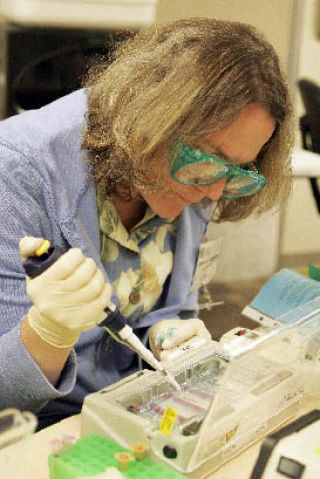Program pairs them with scientists
Two Kent teachers are among approximately 30 area science educators who spent part of their summer vacation learning ways to get students more excited about science.
Kent-Meridian High School teacher Debbie Robins and Kentridge High School teacher Madonna Brinkmann worked beside scientists in research laboratories at Fred Hutchinson Cancer Research Center and several other partner sites in Seattle through July 30, part of the center’s Science Education Partnership. The workshop started July 14.
Designed to help hone teachers’ lab techniques and teaching strategies in the life sciences – particularly genetics and molecular biology – the workshop allows teachers to try out a variety of lab experiments they can then take back to the classroom. Robins said she applied to be a part of the program based on references from fellow teachers, and she’s glad she did.
“The program’s actually really nice,” she said. “We’ve been learning some microbiology techniques that we can use in the classroom to kind of get the kids excited about science and make them aware of some of the things that are going on today.”
She said the experiments she’s learning will be especially beneficial because they’re relevant to modern research, preparing students interested in science fields for future careers.
“It’s very relevant and job-related, especially if they want to be medical researchers,” Robins said.
Nancy Hutchinson, director of the Science Education Partnership, said increasing interest in science careers is one main goal of the 18-year-old program.
“Our goal is for teachers to bring back what they learn over the summer to help jump-start their students’ knowledge of bioscience and research and perhaps kindle their interest in jobs or careers in science,” she said.
Hutchinson said science is a difficult subject to teach, and exposing teachers to professional scientists and their real-life research techniques give teachers an advantage in the classroom.
After a session to learn laboratory basics, the teachers in the workshop spend about half of their time working one-on-one with a scientist-mentor in the lab on projects in line with their interests. Lab work in past workshops has focused on such topics as protein structure, DNA sequencing, yeast genetics and fruit-fly development.
The other half of the teachers’ time is spent in the Teaching Laboratory at the Hutchinson Center, where they work as a group with master teachers experienced with the Science Education Partnership workshops. During this time, they focus on techniques in the classroom and work to develop curriculum plans for the year.
Key to the curriculum planning is the program’s science-kit loans. The kits, assembled and maintained at the Hutchinson Center and available to the teachers in their classrooms, contain all the equipment necessary for experiments in such areas as bacterial transformation and fruit-fly genetics.
“The kids really like it,” Robins said. “It’s so hands-on and things move around and colors change. They get really excited about it.”
The kits have become popular and widespread in Washington classrooms. Last year, more than 130 teachers and 14,000 Washington students worked with them in their science classes. And Hutchinson said the kits, which cost up to $10,000 each, are very authentic.
“We send out the real thing,” she said. “These are not kids’ toys.”
In addition to learning and giving access to the kits, the program also provides teachers with surplus lab supplies, access to a multi-media resource library and a $500 stipend and graduate-level credit through the University of Washington.
Overall, Robins said the workshop has been a good experience.
“It’s fun to interact with other teachers and use my knowledge at a different level,” she said. “And hopefully, this will help advance my students’ knowledge and get them more excited about science.”
For more information about the Fred Hutchinson Cancer Research Center and the Science Education Partnership, visit www.frcrc.org.
Talk to us
Please share your story tips by emailing editor@kentreporter.com.
To share your opinion for publication, submit a letter through our website https://www.kentreporter.com/submit-letter/. Include your name, address and daytime phone number. (We’ll only publish your name and hometown.) Please keep letters to 300 words or less.

